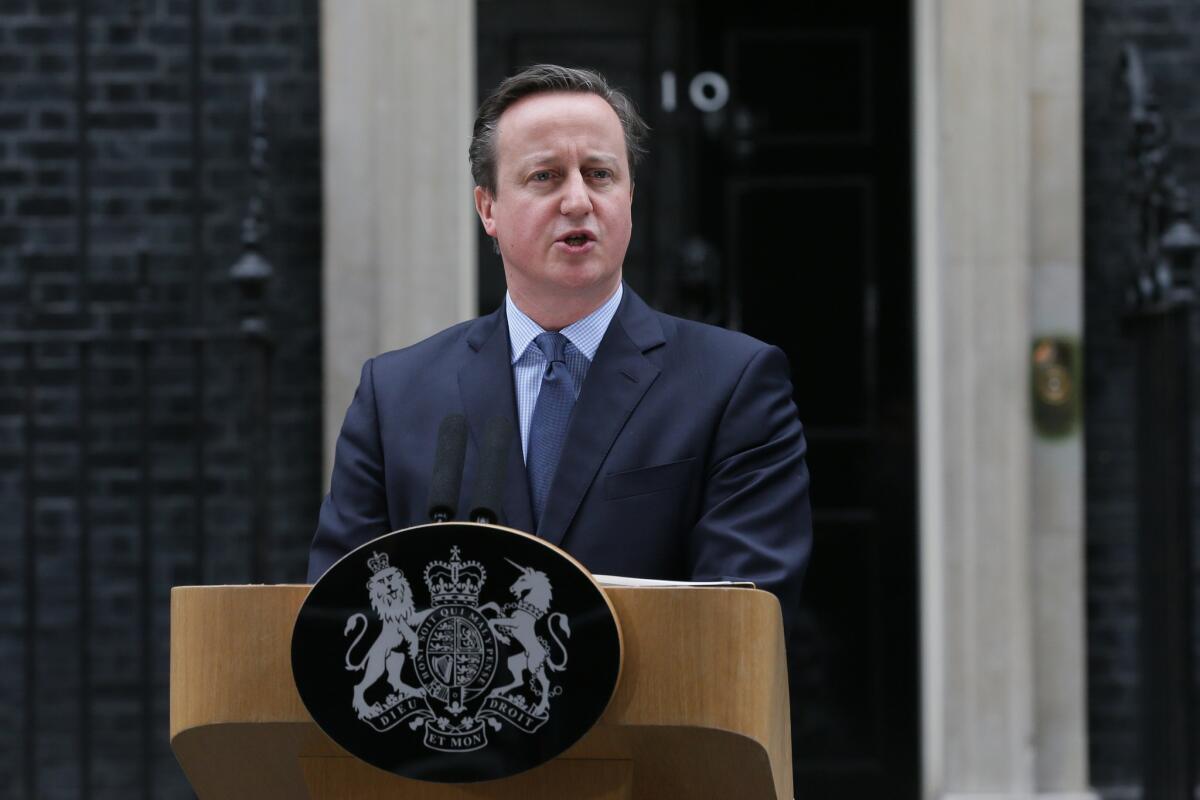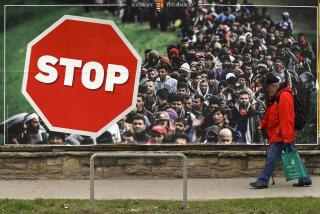What kind of deal did Britain negotiate with the EU, and what happens next?

British Prime Minister David Cameron addresses the media after a Cabinet meeting in London on Feb. 20.
British Prime Minister David Cameron has spent months shuttling between European capitals to secure backing for a deal that would keep his country from bolting the European Union.
He claimed victory Friday in the final hours of a tough two-day summit. But the hard work has just begun: Now Cameron has to sell the deal to his own party and the British electorate.
The agreement reached with European leaders would provide greater protection to Britain from rules and principles that it does not like, including requirements to provide equal benefits to all EU residents living in Britain and to contribute to financial bailout packages for members of the eurozone to which the country does not belong. However, Euroskeptics within Cameron’s own Conservative Party argue that it does not go far enough.
NEWSLETTER: Get the day’s top headlines from Times Editor Davan Maharaj >>
A referendum on whether to remain in the 28-member bloc is expected June 23.
What is in the agreement?
Special status for Britain
Britain has long had a love-hate relationship with the EU. It opted out of being part of the common currency, the euro, and is not part of a passport-free travel zone. Still, some felt that Britain was becoming beholden to too many EU rules, and calls for a separation have been growing.
Cameron contends that the deal he negotiated offers Britain the “best of both worlds” -- the ability to work cohesively with its European neighbors on issues such as trade and security but opt out of other elements of EU membership that it finds less palatable.
Child benefit payments for migrants
Hundreds of thousands of people have moved to Britain from other EU countries in the past decade seeking higher-paid jobs. Upon arrival, they can claim benefits for their children, who in many cases continue to reside in their home countries.
Cameron wanted the practice stopped, arguing that it was putting a strain on Britain’s already overstretched welfare system. This was a particularly difficult sell to Eastern European nations that account for a large portion of these migrants. But an agreement was reached to calculate the benefits based on the cost of living where the children reside.
The new rules would not apply to migrants already in Britain until 2020.
Emergency brake on migrant workers’ benefits
EU migrants in Britain can also claim additional benefits if they are in low-paying jobs.
Cameron successfully negotiated for the ability to put an “emergency brake” on these benefits in the event of “exceptional” levels of migration. Such a move would need EU approval, although Cameron says he has received assurances that this would be automatic.
Once triggered, benefits for migrants would be phased in gradually over a four-year period. However, the limits could only remain in effect for seven years, less than the 13 years Cameron had sought.
Ever closer union
A founding principle of the EU is the idea of “ever closer union among the peoples of Europe.” This has never sat comfortably with Britain, which has tended to set itself apart from the rest of Europe. That is partly because the country is an island, but also because it has always taken its sovereignty very seriously.
The proposed deal states that Britain cannot be forced into greater political integration, a provision that would also be written into the EU treaty. This would ensure that the country is never part of a “European superstate,” Cameron said.
Financial protection
The EU would for the first time formally recognize that the euro is not the only currency in Europe. Countries that are outside the 19-member eurozone would be able to delay and force a debate about any financial rules that could negatively affect their economies.
Cameron said this would create safeguards for Britain’s large financial services hub in the City of London. It would also mean that British businesses no longer have to relocate to mainland Europe to ensure they are not getting an unfair deal by operating outside the eurozone, he said.
Eurozone bailouts
When the global financial crisis hit, there was much criticism in Britain about the way it was handled in many of the capitals that use the euro.
As an EU member, Britain found itself required to help bail out counties like Greece when it was teetering on the brink of a financial meltdown. Under the new deal, however, countries that are not in the eurozone would not have to contribute.
What happens next?
Cameron called a Cabinet meeting Saturday to brief ministers about the deal -- the first time Cabinet has met on a Saturday since the 1982 Falklands War.
He later announced that a promised referendum on whether to remain in the European Union will take place June 23, a date that will have to be approved by Parliament.
While the negotiations were under way, the most senior government ministers were not permitted to express their points of view on the subject. But those restrictions have now been lifted and campaigning is expected to be heated.
Who backs the deal?
Prime Minister David Cameron firmly supports the deal.
“It underlines our special status through which families across Britain get all the benefits of being in the EU, including more jobs, lower prices and greater security,” he said. “But our special status also means we are out of the parts of Europe that don’t work for us.”
Members of the opposition Labor Party have also come out in support of the agreement, along with Liberal Democrats and members of the Scottish National Party.
Who opposes the deal?
The far-right UK Independence Party has been a loud critic.
“This is a truly pathetic deal,” party leader Nigel Farage said in a tweet Friday. “Let’s Leave the EU, control our borders, run our own country and stop handing £55m every day to Brussels.”
At least six Cabinet members are also expected to vote to leave the EU. They include Justice Secretary Michael Gove, a close ally of Cameron.
“Instead of grumbling and complaining about the things we can’t change, and growing resentful and bitter, we can shape an optimistic, forward-looking and genuinely internationalist alternative to the path the EU is going down,” Gove said in a statement.
Boyle is a special correspondent.
ALSO
U.S. airstrike destroys Islamic State training camp in Libya
Cease-fire in Syria? The warring parties aren’t even talking
At 15 cents a gallon, it’s the cheapest gas in the world -- yet Venezuela worries
More to Read
Sign up for Essential California
The most important California stories and recommendations in your inbox every morning.
You may occasionally receive promotional content from the Los Angeles Times.










